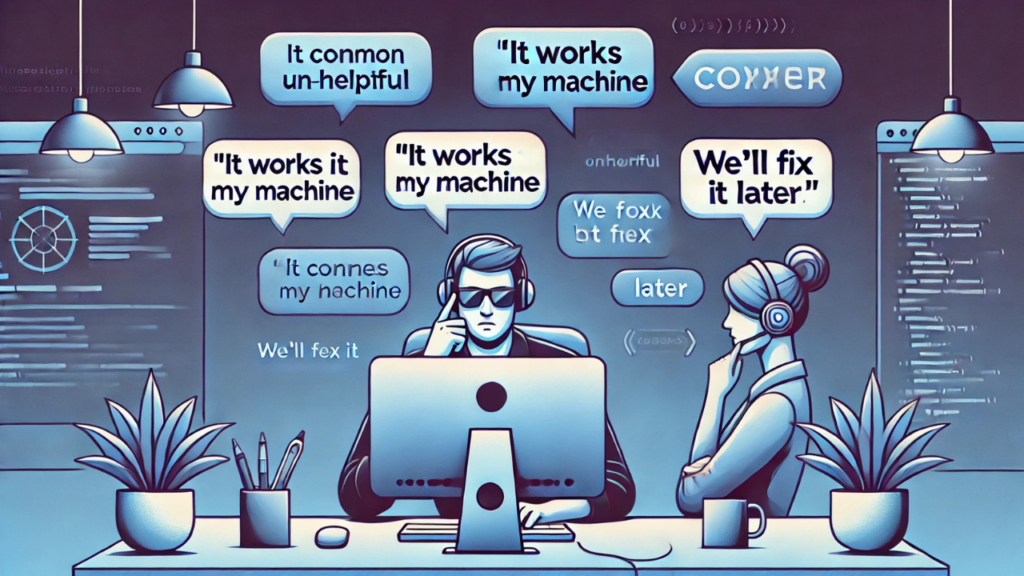Introduction
As a developer, your words shape how you collaborate and solve problems. Certain phrases, though common, can hurt teamwork, slow down progress, and block innovation. By replacing these negative expressions with proactive communication, you can improve collaboration, build trust, and enhance productivity. Let’s explore the top 10 phrases developers should eliminate—and what to say instead.
1. “It Works on My Machine”
This phrase is a classic developer excuse. While your code might run flawlessly on your local setup, that doesn’t mean it works everywhere. Saying this dismisses the real issue and frustrates your team. A bug that appears only in specific environments could indicate deeper problems, such as dependency mismatches, configuration differences, or missing files.
What to Say Instead:
- “Let’s check the environment differences and find a solution.”
- “Can you show me where it’s failing? I’ll help debug.”
- “I’ll try replicating the issue in a different setup to pinpoint the cause.”
Taking ownership of the problem shows professionalism and fosters teamwork. Instead of pushing the blame onto others, take a step back, analyze the situation, and work toward a fix.
2. “That’s Not My Job”
Silos in development teams slow progress. Saying this makes you appear uncooperative and resistant to growth. Successful developers embrace opportunities to learn and support their team. While no one expects you to do everything, a willingness to collaborate goes a long way in fostering a positive work culture.
What to Say Instead:
- “I’m not an expert in this, but I can try to help.”
- “Let’s check with the right person, but I’m happy to assist where I can.”
- “I don’t usually handle this, but I’ll point you to someone who can.”
A team-player mindset builds stronger, more adaptable teams. Being open to stepping outside your immediate responsibilities makes you a more valuable team member and helps the project move forward more efficiently.
3. “I Can’t Fix That”
Giving up before trying limits growth. Development is all about problem-solving. Even if you don’t know the solution immediately, you can still investigate and collaborate. Every problem has a solution, even if it takes time to find the right approach.
What to Say Instead:
- “This is a challenge, but I’ll look into possible solutions.”
- “I’ll research this and get back with options.”
- “Let’s troubleshoot this together and see what we can do.”
Approaching problems with curiosity leads to breakthroughs. The best developers don’t know all the answers, but they know how to find them.
4. “It’s Just a Small Change”
Small changes can have big consequences. Underestimating a task can lead to unrealistic expectations and rushed work. Even minor tweaks can introduce unforeseen issues, especially in complex codebases.
What to Say Instead:
- “I’ll need to review the dependencies before estimating.”
- “It seems simple, but let’s check the impact before making changes.”
- “A small change here might affect multiple components. Let’s be cautious.”
Setting realistic expectations prevents last-minute crises. Always consider testing and potential side effects before assuming a change is trivial.
5. “I Didn’t Test It”
Skipping testing is a recipe for disaster. Testing ensures reliability and prevents future issues. Admitting you skipped testing signals carelessness and a lack of professionalism.
What to Say Instead:
- “I’ve tested it locally, but let’s run more tests in staging.”
- “Let me double-check the test cases before deployment.”
- “I’ll add more test coverage to ensure stability.”
Quality assurance is a responsibility, not an option. A thorough testing process saves time and frustration down the road.
6. “That’s Impossible”
Declaring something impossible limits creativity. The tech world thrives on innovation. What seems impossible today might just need a different approach.
What to Say Instead:
- “This is tough, but let’s break it down into smaller problems.”
- “I’ll explore some alternative solutions.”
- “It’s challenging, but we might find a workaround.”
Staying open-minded leads to innovation. The best solutions often come from thinking outside the box.
7. “That’s Not a Priority”
Dismissing issues outright creates frustration. While prioritization matters, clear communication helps maintain alignment within the team.
What to Say Instead:
- “This isn’t urgent now, but let’s revisit it later.”
- “Let’s check the project roadmap and see where it fits.”
- “I understand its importance, but here’s why we’re focusing on other tasks first.”
Transparent communication builds trust and clarity. Managing priorities effectively requires clear reasoning and open discussion.
8. “We’ve Always Done It This Way”
Sticking to outdated methods prevents progress. Just because something worked before doesn’t mean it’s the best approach now. The tech industry evolves rapidly, and staying flexible is essential.
What to Say Instead:
- “Let’s evaluate if this method is still effective.”
- “We can explore new ways to improve efficiency.”
- “Is there a reason we stick to this approach? Let’s discuss alternatives.”
Embracing change keeps teams and products evolving. Challenge outdated assumptions and seek continuous improvement.
9. “My Code Is Perfect”
Confidence is great, but claiming perfection comes off as arrogant. No code is flawless, and feedback helps improve quality.

What to Say Instead:
- “I’ve done my best, but I’m open to feedback.”
- “Let’s review it together and see if we can improve anything.”
- “There’s always room for optimization. Let me know what you think.”
Humility leads to better collaboration and stronger code. Peer reviews and constructive criticism make everyone better.
Conclusion
Developers thrive on problem-solving and teamwork. The words you choose impact how you interact with colleagues and approach challenges. By eliminating these 10 phrases, you create a more productive and supportive work environment. Instead of shutting down conversations, focus on solutions. Growth comes from adaptability, collaboration, and continuous learning.
At StartupHakk, we encourage developers to stay open to new ideas, embrace challenges, and always look for ways to improve. The best developers aren’t just great coders—they’re great communicators. Keep learning, keep growing, and keep hacking your way to success!




